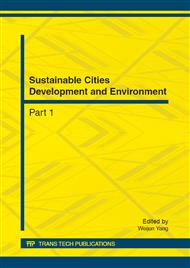p.485
p.492
p.499
p.503
p.507
p.512
p.516
p.521
p.526
Research of Land Use Efficiency in Mountainous Township Based on the Methods of DEA
Abstract:
Town land is the carrier of town’s economy, society and environment, and its land use efficiency has a close relationship with town’s economic development as well as living environment construction. This study selects towns of Zigui County as research objects to explore characteristics of land use efficiency in mountain areas. The study results show that: 1) Maoping, Lianghekou, Meijiahe and Moping, of which technical efficiency and scale efficiency equal to 1, achieve the best condition of land use efficiency. 2) In Quyuan, Guizhou, Shuitianba, Xietan and Zhouping, moderately enlarging towns’ scale will be helpful to strengthen agglomeration economy effect, and improve towns land use efficiency. While in Shazhengxi, Yanglinqiao and Guojiaba, it needs to decrease these towns’ scale moderately to prevent the waste of resource. 3) Inputs’ inefficiency and outputs’ insufficiency are the main factors result in the differences of input and output efficiency. 4) Accelerate Industrial Restructuring, optimize Industrial Structure, improve service efficiency of fixed assets investments, appropriately control the scale of construction land are the most important way to improve land use efficiency in Zigui County.
Info:
Periodical:
Pages:
507-511
Citation:
Online since:
October 2012
Price:
Сopyright:
© 2012 Trans Tech Publications Ltd. All Rights Reserved
Share:
Citation:


